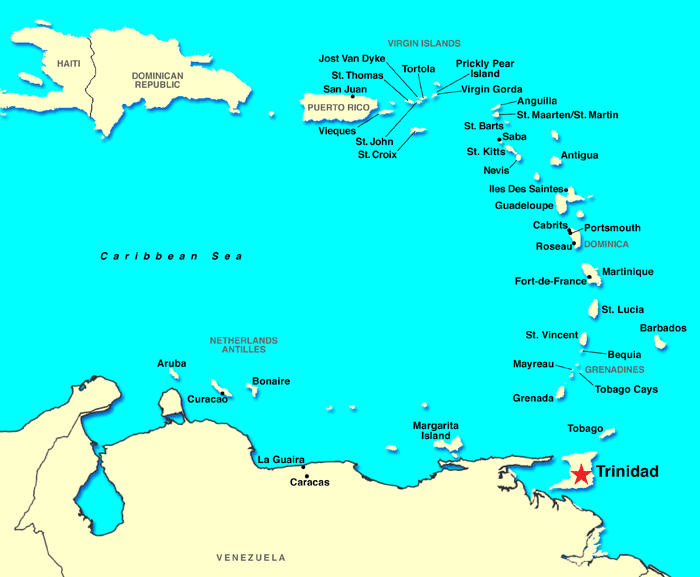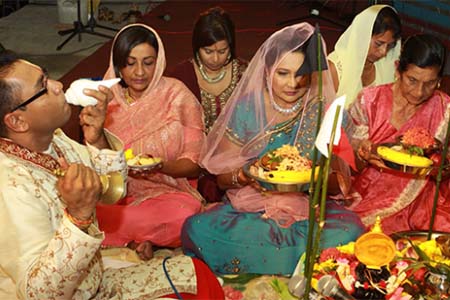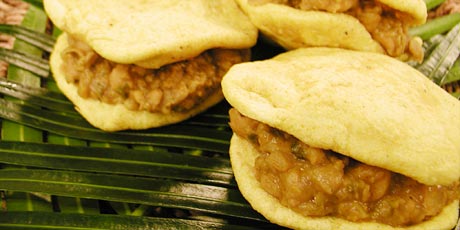The country of Trinidad, sometimes called the “rainbow island,” has a reputation of incredible diversity in regards to its music, food, and population. Located just eleven kilometers off the coast of Venezuela, Trinidad has a total population of 1.3 million. The makeup of its people ranges from African and East Indian, to European, and a variety of overlap of all of these. The main religion of the island is Roman Catholic, with Protestantism, Islam, and Hinduism also practiced.
History:
The original name for the island was “Iëre,” or Land of the Humming Bird, but Christopher Columbus changed it upon his arrival in 1498 to “La Isla de la Trinidad,” or The Island of the Holy Trinity. Today, Trinidad is a thriving Caribbean nation that bases much of its economy on gas-based export.
Although native Amerindians originally populated the island, Spanish, British, and French forces came to colonize it. They shipped the native Amerindians off to other colonies in the Caribbean to work and over time imported mass amounts of African slaves to labor on sugar plantations. After the British abolished slavery, indentured laborers were imported from India, China, and the Middle East. In 1889, England joined Trinidad to the nearby Tobago as an administrative ward, with which it stayed connected even after its independence from England in 1962. Over time, the descendants of the many non-native groups came together and fused their cultures, creating a melting pot that is the status quo in Trinidad today.
Culture:
All throughout the year, festivals take place that represent a variety of Trinidadian culture. Many of these festivals celebrate religious holidays, while others celebrate the traditions, customs, and music of Trinidad. The more popular religious festivals include Santa Rosa Festival, Christmas, Easter, Divali, and the Muslim celebration Eid Ul Fitr. There are multiple festivals that are based around the music of the Caribbean, such as Carnivale, J’ouvert and the national steel pan competition Panorama. In addition, the people of Trinidad also celebrate festivals pertaining to their history and customs, such as Emancipation Day and Arrival Day. No matter what time of year, there is sure to be a celebration happening in the streets of Trinidad.
Food:
The food of Trinidad is just as diverse as its population. Its history of colonization and labor importation led to a cuisine that contains a vast array of influences, including East Indian, Spanish, African, Chinese, and Middle Eastern. The most well known is Creole, a cuisine developed from robust stews and one pot comfort foods brought to the island by African slaves. Signature Creole dishes include pelau (a spicy dish consisting of meat, rice, and pigeon peas), macaroni pie (baked macaroni and cheese), and callaloo (a stew made with leaf vegetable, coconut milk, crab, chili pepper, lobster and many more). Another popular form of cuisine is street food, such as barbecue and jerk meats, homemade ice cream and coconut water.
Music:
Like much of the Caribbean, Trinidad has a lively music scene. Many varieties of music in Trinidad are a result of its historical influences, such as African and Indian based folk and classical forms. However, the mixing of cultures has led to the development of several indigenous forms of music as well, including soca, rapso, parang, chutney, and other derivative and fusion styles. The steelpan drum , a chromatically pitched percussion instrument made from 55 gallon drums that formerly contained oil and similar substances, also originated on the island. Oftentimes, local communities fuse the steelpan with international classical and pop music. The music of Trinidad provides something for every taste, once again illustrating the diversity of the culture of Trinidad.
Trinidad can be characterized as a beautiful Caribbean nation with a population whose spirit is just as impressive. The people are friendly and upbeat, and filled with a pride so strong that they celebrate almost constantly. The music, food, and ethnicity of the small island combine to create a culture that gives anyone visiting a vast amount to experience. I know I would love to see firsthand the diversity of this small Caribbean nation. On July 19, Go Eat Give is hosting Destination Trinidad at Tassa Roti Shop in metro Atlanta, where the public can witness live music, speakers and an authentic Trinidad buffet. For more information about this event, click here.
~ By Allie Williams, a recent graduate of the University of Georgia. Allie explores her passion for food, travel, and learning about different cultures though her internship with Go Eat Give.


